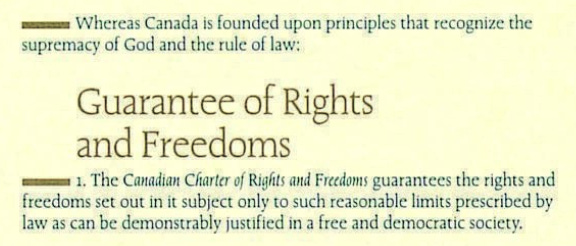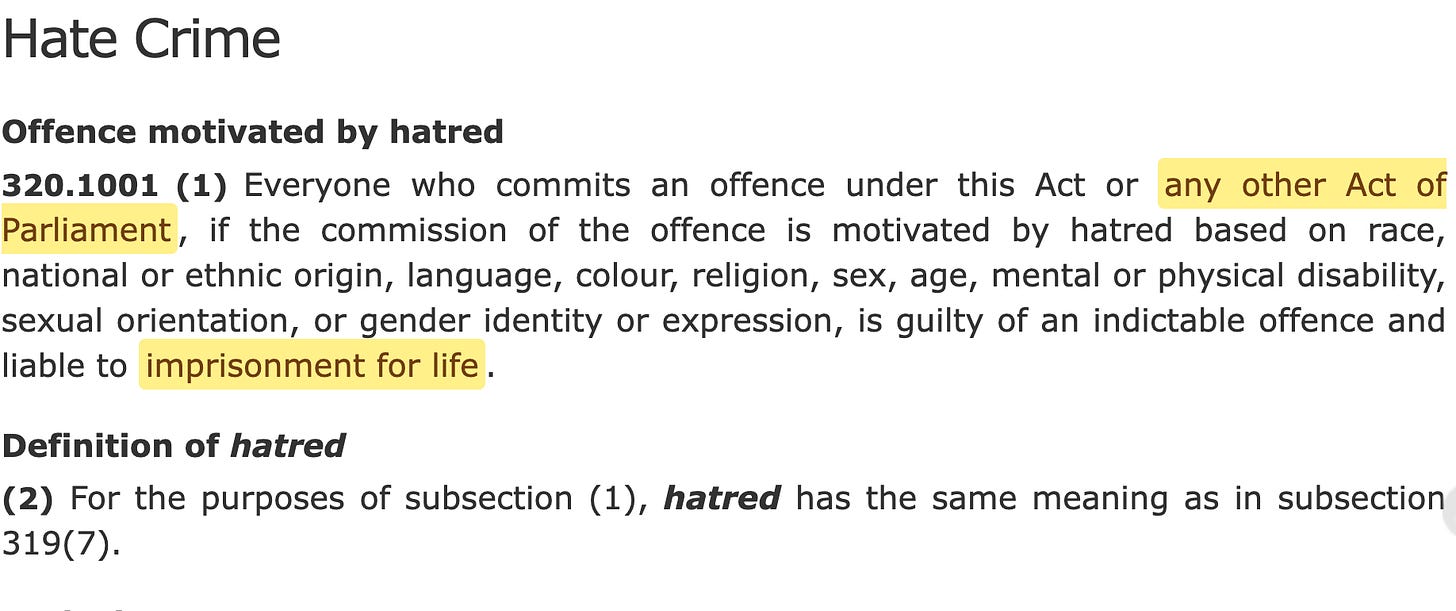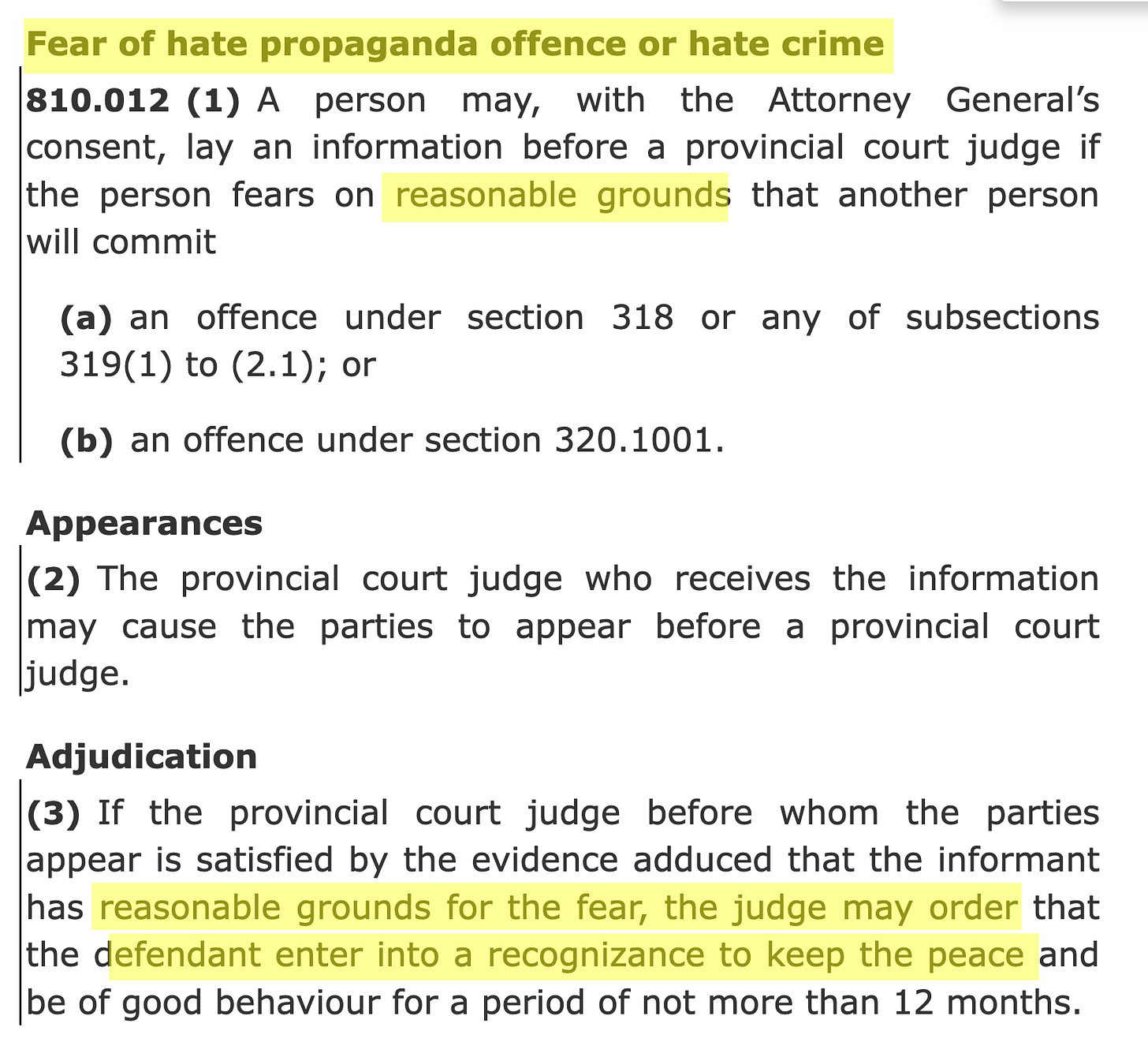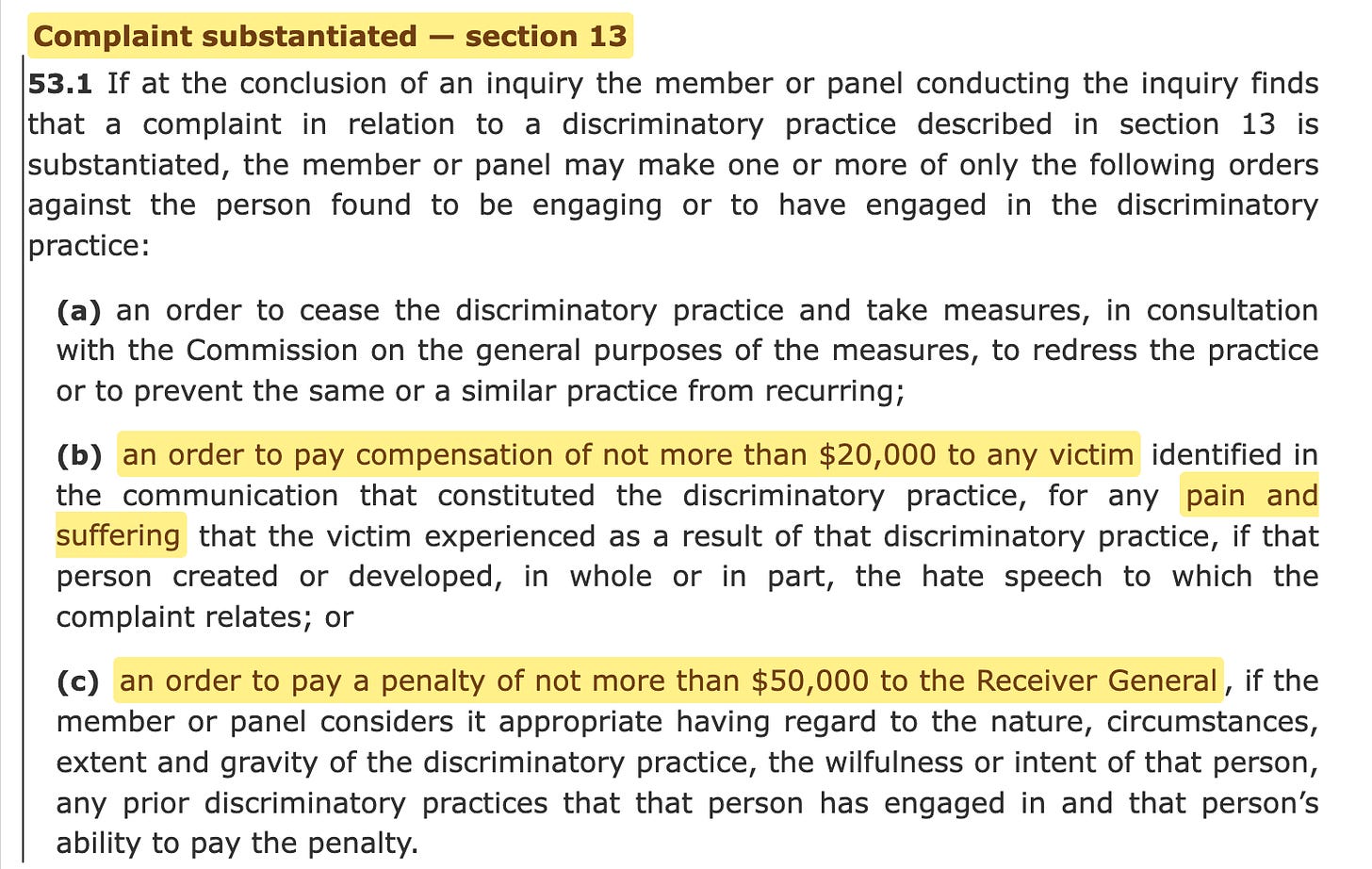Matt Taibbi: Blame Canada? Justin Trudeau Creates Blueprint for Dystopia in Horrific Speech Bill
On February 21st, Canadian Prime Minister Justin Trudeau gave a press conference in Edmonton, announcing his government’s decision to introduce the Online Harms Act, or Bill C-63. It was described in Canadian media as a “bill to protect kids” that would stop the “exploitation of children,” and Trudeau’s curt speech focused solely on minors. The scarf-clad PM angrily dismissed criticisms the bill might have a broader focus.
“I look forward to putting forward that Online Harms bill, which people will see is very, very specifically focused on protecting kids, and not on censoring the Internet,” he said sharply. “I think everyone, wherever they are in the political spectrum, can agree that protecting kids is something governments should be focused on doing.”
Soon after, on February 26th, Trudeau’s government introduced the bill. Canada’s stable of retreating, credulous on-air personalities announced its rollout like the arrival of penicillin. “Tonight, Web of Harm,” gushed CTV’s Omar Sachedina. “Tackling online dangers and safeguarding children… The long-awaited framework for protecting the vulnerable…”
There was little initial uproar. What could be wrong with increasing child safety, or “protecting the vulnerable”?
Then people read the bill.
“If you look at the purpose of this law, it’s actually quite noble and most lawyers would agree with it,” says Canadian attorney Dan Freiheit. “Online safety, protecting children’s physical and mental health.” But the actual text?
“It’s wild,” Freheit says.
Trudeau was lying when he said C-63 was “very, very specifically focused on correcting kids.” The purview of the Online Harms Act extends far beyond speech, reimagining society as a mandated social engineering project, creating transformational new procedures that would:
- enlist Canada’s citizens in an ambitious social monitoring system, with rewards of up to $20,000 for anonymous “informants” of hateful behavior, with the guilty paying penalties up to $50,000, creating a self-funded national spying system;
- introduce extraordinary criminal penalties, including life in prison not just for existing crimes like “advocating genocide,” but for any “offence motivated by hatred,” in theory any non-criminal offense, as tiny as littering, committed with hateful intent;
- punish Minority Report pre-crime, where if an informant convinces a judge you “will commit” a hate offense, you can be jailed up to a year, put under house arrest, have firearms seized, or be forced into drug/alcohol testing, all for things you haven’t done;
- penalize past statements. The law gets around prohibitions against “retroactive” punishment by calling the offense “continuous communication” of hate, i.e., the crime is your failure to take down bad speech;
- force corporate Internet platforms to remove “harmful content” virtually on demand (within 24 hours in some cases), the hammer being fines of “up to 6% of… gross global revenue.”
Things you’re saying, things you’ve already said, things an administrative judge thinks you might say, all barred, with neighbors deputized as enforcers? Good times. Leave it to Trudeau, a frequent trailblazer in new forms of illiberalism in the digital age, to come up with this quantum leap downward on the rights front. C-63 is a Frankenstein’s Monster combining the worst censorship ideas already deployed by supposed ally government-in-laws like Europe’s Digital Services Act, Australia’s updated Australian Communications and Media Authority Act (ACMA), and Scotland’s Hate Crime and Public Order Act, which saw 7,152 complaints in its first week when the law took effect last month.
Trudeau’s creation is a turbo-charged social surveillance law aimed first at forcing big platforms like Facebook and Twitter to “self-police,” but secondarily targeting individuals and doling out civil and criminal penalties for speech and thought on a scale not seen anywhere. What constitutes hateful conduct? While the bill newly defines hate speech as “likely to foment detestation or vilification” of Canada’s growing list of protected groups and individuals, Canadian lawyers interviewed were generally unsure of what the standard might look like in practice.
“It’s impossible to know what exactly it’s going to mean,” says Bruce Pardy, Executive Director of Rights Probe. “So you’re going to have to rely upon the court in a criminal prosecution, or the human rights tribunal in a human rights proceeding, to put their own interpretation on that, and figure out where the line is.”
Despite being split on how serious the immediate impact might be (“We’re not looking at prisons full of people doing life for misgendering” said one), most attorneys seemed to agree C-63 will be a game-changer if passed, aimed beyond speech at the very concept of individual rights, chipping away at ideas like the presumption of innocence and the right to face one’s accuser, and using traditionally dubious tools like ex post facto laws.
On one level, it’s not surprising, given Canada’s historically diffident attitude toward rights — the first section in the country’s Charter of Rights and Freedoms, ironically introduced when Trudeau’s father Pierre was Prime Minister, is essentially a giant loophole — but this Prime Minister appears determined to swap out Canada’s reputation for brotherhood, humor, and generosity for a new one based on rigidity and collective paranoia.

There’s a long backstory of important recent laws and Supreme Court cases that helped push Canada down a path toward C-63, but this bill still stands apart as a unique problem, and only a few domestic media outlets have been willing or able to criticize it. One of those is Rebel News, whose founder Ezra Levant says Canadians could really use America’s help in sounding the alarm. “Canadians need to fight for our own freedom, but the Canadian political and media establishment are obsessed by what U.S. journalists and politicians have to say about us,” Levant says. “So any attention Americans can bring to this civil liberties bonfire really makes a difference. Frankly, we need your help.”
How bad is C-63? See for yourself, in a tour through its key sections:
The biggest headline-grabber in C-63 involves new provisions for life imprisonment for speech offenses. There are really two. “Advocating genocide” is already a crime in Canada, but C-63 boosts its maximum penalty from five years to life. “Life sentences for sending out some words. That’s heavy,” Canada’s former Supreme Court Chief Justice, Beverley McLachlin, told journalist Edward Greenspon.
Andrea MacLean of the Calgary-based JSS Barristers is among the lawyers who don’t necessarily foresee an avalanche of life sentences for speech offenses, but does worry the draconian life sentence provisions might have serious downstream effects.
“They might encourage people to take plea deals they wouldn’t otherwise take,” MacLean says.

As bad as the “sending out some words” portion is, a more frightening provision prescribes potential life sentences for any “offence motivated by hatred.” This is a difficult concept, but what the law proscribes is any violation of any “Act of Parliament,” no matter how minor, combined with hateful motivation. One example given was crumpling up an anti-gay flier and throwing it out the window in a national park, which would combine a federal littering prohibition with hate speech. Another attorney suggested this could refer to something like denial of restaurant service, and marveled that “this takes civil offenses and makes them into crimes.”
I heard conflicting takes on this section, and it’s worth noting that Justice Minister Arif Virani has repeatedly described this “offence motivated by hatred” section as hateful intent mixed with a “criminal” offense like theft, assault, or murder. But the text reads like a parody of the American “hate crime enhancement” idea:

The “prior restraint” portion of C-63 describes the process by which a person can be punished preemptively if an informant convinces a judge that either a “hate propaganda offence” or the aforementioned “offence motivated by hatred” has a “reasonable” chance of occurring:

This clause might particularly affect a high-profile person like J.K. Rowling who’s already declared an intention to keep saying things deemed offensive to Canadians, who in 2017 passed a law (C-16) forbidding “gender identity” discrimination. Pardy, who described the 2017 measure as a “weaponization of human rights law,” says C-63 is like that act “on steroids.” This pre-crime provision includes a long list of potential punishments, ranging from house arrest, scheduled exit and entry from the home, ankle monitoring, and seizure of firearms. MacLean pointed out that this guts Canada’s Section 11 guarantee of presumption of innocence unless guilt is proven “beyond a reasonable doubt.” Again, a “reasonable” chance the crime will occur is sufficient to justify detention:

The Online Harms Act gets around the Charter of Freedoms, which forbids punishment of ex post facto or “retroactive offenses,” through a clever piece of wordsmithing. It defines the hate speech crime as “continuous communication” of hateful speech, i.e. making the failure to take down speech on the Internet that could be removed the crime. One lawyer commented to me that this will immediately cause a flurry of activity by conservatives desperate to remove “misgendering” language, since a previous law, C-17, mandated use of appropriate pronouns:

Perhaps scariest of all is the section all of the attorneys pointed to as one most likely to cause significant change in society: the snitching clause. A pair of provisions allows complainants to level accusations at no cost. If an administrative authority substantiates the claim of hateful conduct, the “informant” receives up to $20,000, while the defendant pays up to $50,000. The incentives “are pretty obvious,” as one Toronto-based attorney put it:

Lastly, the bill makes plain that informants can avail themselves of procedures to anonymize their accusations, leaving defendants unable to face their accusers (in “recognizance,” they can be restrained from approaching their accusers as well):

The bill is not law yet. It still needs to survive multiple readings and pass parliament, but the consensus seems to be it has an excellent chance of becoming law, among other things since it was designed to be immune to legal challenge, with its more alarming passages culled from already adjudicated Canadian Supreme Court cases. “The fault that lies behind C-63 has already largely been established by the Supreme Court,” says Pardy. He points to cases like Saskatchewan v. Whacott, which says that a law may infringe on your right to free expression and still be “reasonable and constitutional.”
How could this happen? “Here’s a symbolic way to describe it,” says Pardy. “America was founded on rebellion. Canada was founded on the idea that we did not want to rebel. Those people who were in the 13 colonies who did not want to rebel, left and came Canada. The loyalists. So, we do not have fighting for freedom running through our history like you.”
“Americans usually ignore Canada because we’re a pretty good neighbor,” says Levant. “But your neighbor’s house is on fire.”





No free country would tolerate such a draconian measure as this proposed Online Harms Act. The title is a deception. They are not trying to protect children. They would never do that. They are against children. They promote sex-ed, transsexualism, homosexual “marriage” and pedophilia.
Their claim to “protect children” is a Big Lie, to hide their real purpose, which is to enable the regime to censor political ideas. It’s just political censorship.
Communists gotta censor – otherwise they lose. They will never censor pornography, however. They like that. Jews promote porn to undermine their host nation. That really does harm children, so they allow it and promote it. Porn is Jewish free speech.
This law has the stink of subcons all over it.
I’m glad I visited Canada 30 years ago. It has some amazing mountains. I will never return. Canadians were known for their collective tolerance. Clearly that philosophy was a total failure.
Our Albion “cousins”, the moronic Brits succeeded in genetically crossing a Dachshund (father!) with a Rottweiler (mother). The product is a short-legged hybrid that looks not unlike the American bull terrier, but does not have its psychopathic character traits.
The principle should be extended to so-called “humanoids”, e.g. crossing Eskimos with Aboriginies to create a particularly intelligent and aesthetically pleasing species that will dominate the world in the future due to its outstanding qualities.
https://www.newsweek.com/rottweiler-daschund-puppy-cross-daschweiler-1899857
https://rumble.com/v4vhnjf-denmark-selling-aryan-trait-sperm-eggs-to-china-india-and-other-non-europea.html
Always this ugly envy of white racists. Nobody is stopping Frau Lokteff from doing the same as the Indians and Chinese and finding an Aboriginal surrogate mother for the fourth child she so desperately wants to have. https://rumble.com/v4lahii-henrik-and-lana-need-one-more-palmgren-baby.html
This would be a great proof of her transcontinental tolerance and her unshakeable belief in the “all-oneness of humanity”. The old wise chieftess Stumpy Brown, also called “holy earth mother of all holy earth mothers”, knows what to do and has many daughters and granddaughters who could benefit economically from surrogate motherhood. https://www.youtube.com/watch?v=C2nvaI5fhMs
So Lara, take the first, and therefore most important, step towards countering this Asian meanness with a powerful counter-offensive. Others will surely follow your shining example, the first herald of genuine Russo-Swedish-Australian international understanding, interconnected from Tutle Island to Turtle Island, so to say.
https://en.wikipedia.org/wiki/Turtle_Island_(Newcastle_Bay)
https://en.wikipedia.org/wiki/Turtle_Island_(Indigenous_North_American_folklore)
Finally live up to your motto “The future is the past”, if it is not to remain an empty phrase, because Australia’s advanced civilization has existed already for 65,000 years. Lara’s fourth, genetically superior child will be endowed with the rare gift of translating insidious, unbelievably malignant and extortionate Australian English into universally understandable Northern Idaho English.
https://www.youtube.com/watch?v=QO3BUpYFZvU
https://www.youtube.com/watch?v=58vgdhXmEWU
This law was initiated and largely drafted by Trudeau’s MP Julie Dabrusin who is an ultra-Zionist – referred to as the “eyes and ears of Netanyahu.” Her family in Israel reportedly live in illegal settlements. The intent of C-63 is mainly to provide protection and cover to Zionist groups and Jewish groups engaged in funding the genocide of indigenous Palestinians. It’s the keystone of Canada’s current and future Zionist occupational government. Canada is free no more is true, this is a dystopic, fascist state run by Zionists pretending to support gay rights and transgenderism, mainly because it keeps gentile birth rates down.